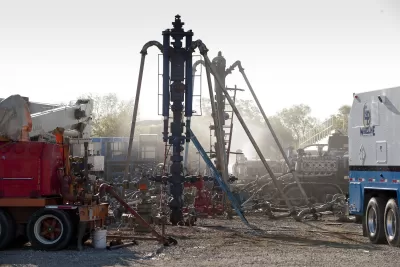Opponents of federal oversight rejoice: a ruling by U.S. District Judge Scott Skavdahl reiterates the limitations of the federal government to regulate fracking.

"A federal judge in Wyoming has struck down the Obama administration's regulations on hydraulic fracturing," reports Camila Domonoske, "ruling that the U.S. Bureau of Land Management doesn't have the authority to establish rules over fracking on federal and Indian lands."
According to Domonoske, "Skavdahl made it clear what he was — and wasn't — considering in his ruling." Here's the judge's own words, taken directly from the ruling [pdf]:
The issue before this Court is not whether hydraulic fracturing is good or bad for the environment or the citizens of the United States....The Constitutional role of this Court is to interpret the applicable statutory enactments and determine whether Congress has delegated to the Department of Interior legal authority to regulate hydraulic fracturing. It has not.
The Department of the Interior issued the regulations in March 2015, requiring "that companies drilling for oil and natural gas disclose the chemicals they use in the fracking process," among other measures, explains Domonoske.
Domonoske also explains that this week's court ruling came down to regulatory powers (or lack thereof) established by the Energy Policy Act of 2005. "As Skavdahl notes, it 'expressly and unambiguously' excludes fracking from the list of oil and gas production processes that the EPA can regulate." Thus, the power to regulate fracking falls not to federal agencies like the EPA or the Department of Interior, but rather to states. For selected passages from the court ruling, see a separate article by Jonathan H. Adler.
FULL STORY: Federal Judge Strikes Down Obama Administration's Fracking Rules

Planetizen Federal Action Tracker
A weekly monitor of how Trump’s orders and actions are impacting planners and planning in America.

San Francisco's School District Spent $105M To Build Affordable Housing for Teachers — And That's Just the Beginning
SFUSD joins a growing list of school districts using their land holdings to address housing affordability challenges faced by their own employees.

The Tiny, Adorable $7,000 Car Turning Japan Onto EVs
The single seat Mibot charges from a regular plug as quickly as an iPad, and is about half the price of an average EV.

Seattle's Plan for Adopting Driverless Cars
Equity, safety, accessibility and affordability are front of mind as the city prepares for robotaxis and other autonomous vehicles.

As Trump Phases Out FEMA, Is It Time to Flee the Floodplains?
With less federal funding available for disaster relief efforts, the need to relocate at-risk communities is more urgent than ever.

With Protected Lanes, 460% More People Commute by Bike
For those needing more ammo, more data proving what we already knew is here.
Urban Design for Planners 1: Software Tools
This six-course series explores essential urban design concepts using open source software and equips planners with the tools they need to participate fully in the urban design process.
Planning for Universal Design
Learn the tools for implementing Universal Design in planning regulations.
Smith Gee Studio
City of Charlotte
City of Camden Redevelopment Agency
City of Astoria
Transportation Research & Education Center (TREC) at Portland State University
US High Speed Rail Association
City of Camden Redevelopment Agency
Municipality of Princeton (NJ)




























